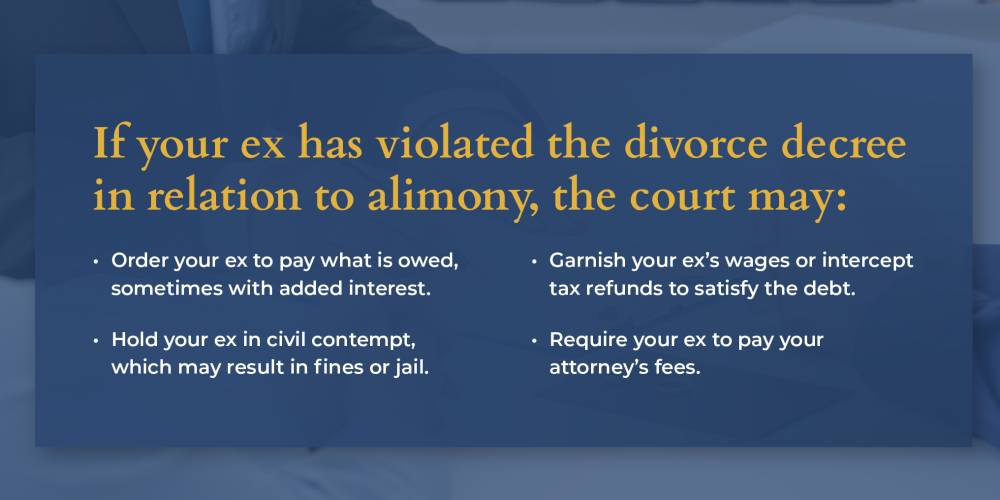What Can I Do If My Ex Stops Paying Alimony in Illinois
 Alimony, known as spousal maintenance in Illinois, is a legally binding obligation for one spouse to make payments to another after a divorce. If your ex-spouse stops making court-ordered payments, you have the right to seek enforcement. Whether the non-payment is on purpose, based on financial hardship, or simply a delay tactic, it is not something you should ignore. The longer it continues, the more difficult it may be to recover what is owed.
Alimony, known as spousal maintenance in Illinois, is a legally binding obligation for one spouse to make payments to another after a divorce. If your ex-spouse stops making court-ordered payments, you have the right to seek enforcement. Whether the non-payment is on purpose, based on financial hardship, or simply a delay tactic, it is not something you should ignore. The longer it continues, the more difficult it may be to recover what is owed.
Illinois courts treat maintenance orders seriously and provide legal tools to ensure compliance. If your ex is not paying alimony, you should act quickly with the support of a skilled Naperville, IL divorce lawyer with over 30 years of experience.
Is My Ex Legally Required to Pay Alimony?
If alimony was included in your divorce judgment, then it is required by law. Under 750 ILCS 5/504, Illinois courts may award maintenance based on the length of the marriage, the income and earning potential of each party, and a variety of other factors. Once ordered, maintenance becomes part of the divorce decree. Failing to pay is breaking the law.
Usually, the divorce decree will include very specific terms: how much your ex must pay, when those payments are due, how long they last, and whether they can be changed.
What Happens If My Ex Stops Paying Alimony?
You have several options when your ex stops paying alimony. The first step is to speak with an attorney. At our firm, you will work with a court-appointed mediator who also holds a master’s degree in guidance and counseling. This means we approach enforcement not only with legal skill, but also with an understanding of conflict, communication, and emotional dynamics.
Your lawyer will begin by reviewing your divorce decree. If your ex has violated it, your attorney can file a petition for enforcement or contempt with the DuPage County Court. The court may:
-
Order your ex to pay what is owed, sometimes with added interest.
-
Hold your ex in civil contempt, which may result in fines or jail.
-
Garnish your ex’s wages or intercept tax refunds to satisfy the debt.
-
Require your ex to pay your attorney’s fees.

Each case is different, but Illinois courts generally have little tolerance for unpaid support, especially if there is no good reason for the delay.
Can Alimony Be Changed or Modified?
Yes, but only through the court. Under Illinois law, alimony may be modified or terminated if there has been a "substantial change in circumstances." That could include job loss, serious illness, or retirement. However, your ex cannot simply stop paying and then ask for a change later.
If your ex is struggling to make payments, he or she must formally ask the court to modify the support order. Until the court grants a change, the original order remains in effect. Missed payments continue to add up, and failure to pay is still considered contempt.
Your attorney can help assess whether a legitimate change in financial circumstances exists. If you suspect your ex is hiding income, has received a new job, or is cohabiting with a new partner, that information may be relevant to enforcement or termination.
How Can I Protect Myself if My Ex is Not Making Alimony Payments?
Many recipients rely on alimony payments to cover basic expenses. When payments stop, it can quickly create serious financial stress, and people often want to get the money they need quickly. If your ex has missed one or more payments, you should document all missed payments, including dates and amounts. Keep records of any attempts you made to resolve the issue privately and do not use any informal agreements or cash payments without a paper trail.
It may be possible to request a lump-sum judgment for the arrears, rather than waiting for your ex to catch up in small installments. In serious cases, the court may impose liens on property or other assets to get payment.
Your attorney can help you evaluate what options are best for your situation, whether that means negotiating a repayment schedule, pursuing wage garnishment, or litigating the matter in court.
Can My Ex Stop Paying Alimony if He Lives Out of State?
Even if your ex no longer lives in Illinois, the support order is still enforceable. Illinois participates in the Uniform Interstate Family Support Act (UIFSA), which allows one state to enforce child support or alimony orders issued by another. Your attorney can start legal proceedings that force your ex to comply across state lines, often by working with the appropriate agency in your ex’s new home state. This process can take longer, especially if coordination is needed with an out-of-state court, but it works.
What If We Never Had a Formal Alimony Order?
Sometimes spouses agree to informal support during or after a divorce, without seeking a formal order. Unfortunately, that leaves few options if payments stop. The court cannot enforce a verbal agreement or private understanding.
If you are in this situation, you may still have legal options. Your attorney can help you file a motion to request retroactive maintenance, especially if there was a long-term marriage, a big difference in income, or recent financial hardship. But timing is important. You must act quickly to protect your rights.
What to Do First if Your Ex Owes You Alimony
Unpaid alimony is not just frustrating. It can disrupt your life, cause hardship, and feel like a betrayal of the divorce agreement you relied on. But Illinois law gives you tools to fight back.
If your ex owes you alimony, the first thing you should do is contact a skilled divorce attorney who can step in and advocate for you. You are more likely to get what you are owed more quickly if you have a good lawyer on your side.
Our Naperville law office has extensive experience handling alimony enforcement throughout DuPage County and beyond. We understand how hard these situations can be, and we approach each case with a strategy meant to deliver results fast.
Contact a DuPage County, IL Alimony Attorney Today
If your ex-spouse has stopped paying alimony, now is the time to take action. Waiting can make enforcement harder and put you at greater financial risk. Call Law Office of Ronald L. Hendrix, P.C. at 630-355-7776 to schedule a free consultation with a Naperville, IL spousal maintenance lawyer and learn how we can help you enforce your alimony order. We are ready to get you the support you are owed.

















